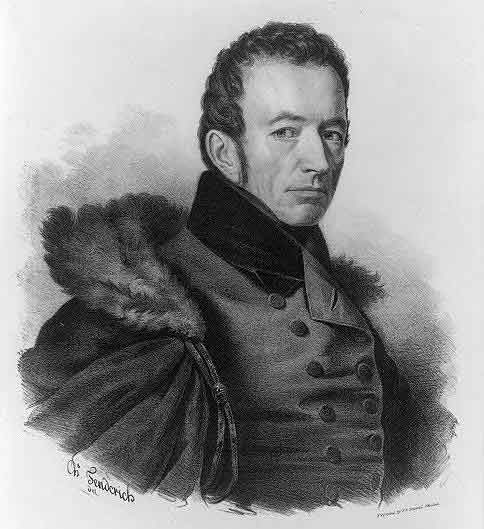Joel R. Poinsett
Fifteenth Secretary of War

Joel Roberts Poinsett was born in Charleston, South Carolina, March 2, 1779 of refined and wealthy parents. They went to England when he was a mere child and remained there several years. He received a very thorough education but on account of delicate health did not pursue a collegiate course. He was supplied with the best of tutors and spent two or three years under the celebrated President Dwight, at Greenfield, Connecticut. In 1796 he went abroad and was engaged in travel and study. He journeyed over much of Europe and considerable portions of Asia all the while giving much attention to scientific and general studies. He became particularly familiar with the science of medicine and with the military art and an accomplished classical scholar. Returning to America in 1809 he was soon afterwards sent by the United States government on a general mission to South American states which had recently revolted against Spanish domination. Having established friendly and commercial relations between his government and Buenos Ayres [sic], he crossed the continent to Chili [sic]. The Spanish authorities of Peru having invaded Chili [sic] and siezed and condemned a number of American vessels at Talcahuano, Mr Poinsett put himself at the head of a small number of Chilians [sic] marched on Talcahuano, retook that place, and released the vessels. Hearing of the war between his country and England, he returned home with the purpose of entering the army, but peace was declared before his arrival. News, as well as everything else, travelled slowly in those days. He was elected a member of the legislature of his State where he originated and secured the passage of several valuable measures of internal improvements. He was a Representative in Congress from 1821 to 1825. While occupying this office he was appointed on a special mission to Mexico at the time under the brief reign of Iturbide. He discharged the delicate duties of the mission with tact and success. In 1825, he was appointed Minister Plenipotentiary to the republic of Mexico, and though others had been appointed to that post before him no one had actually occupied it. He was the first American Minister to that republic. He was also appointed Minister Plenipotentiary to the famous Panama Congress. Early in his mission to Mexico he negotiated a treaty of commerce between our (U.S.) government and that country. Later, his position became one of constant annoyance and difficulty and at times of imminent danger to the Minister. The country was in a greatly disturbed condition by reason of no end of local factions; Spain was still contending to regain power, sending armies of invasion; a singular jealousy of the United States had possessed many minds, or rather the notion that the republic of the United States was extremely jealous of the republic of Mexico! Mr Poinsett, it appears, had established one or two lodges of Free-Masons, and though none but prominent patriots and republicans became members of these societies they were charged with being a secret means for the reestablishment of Spanish authority. Several of the Mexican States demanded his recall and a proposition of this kind in the Congress was defeated by only three votes. Threats of assassination were freely made against him and at one time the office of the legation was attacked. In all these difficulties and dangers Mr, Poinsett remained perfectly cool and dignified. "In the discharge of my duty," he said, "I know no fear." His intrepid conduct awed his assailants and while preserving the honor of his country and the sacredness of its flag on the occasion just referred to, secured him the special regard of his countrymen everywhere. He returned to the United States in the early part of 1830.
An exceedingly interesting portion of Mr Poinsett's life was that with regard to the nullification agitation, which, originating in South Carolina, at this time and for a considerable period afterwards caused great excitement throughout the whole country. In this famous contest Mr Poinsett was the leader of the Union cause in South Carolina, a position for which his great abilities, unflinching pluck, lofty character, persuasive eloquence, and conservative nature peculiarly qualified him. Thus a strong and respectable Union element was maintained in South Carolina during all the dark hours of the "folly and madness" of nullification.
Upon Mr Van Buren's inauguration as President, in March 1837, Mr Poinsett was made Secretary of War. This position he retained during the administration and so conducted its affairs as to receive the general approbation of the country, when not much connected with Mr Van Buren was generally approved. Mr Van Buren is about the least understood and the most unappreciated of all our historical characters. He is the great American "victim o' gammon." While Secretary of War, Mr Poinsett took a leading part in founding the National Institute (note: which later became the Smithsonian Institute) to which he contributed a valuable museum. Later he founded an Academy of Fine Arts at the city of Charleston. He was the author of a work on Mexico published in 1824, and after his retirement at the close of Mr Van Buren's administration, delivered a number of addresses on scientific and practical topics, which, with miscellaneous essays were published and had a considerable popularity. He died at Stateburgh, South Carolina, December 12, 1851, universally loved and respected by all of his intelligent countrymen and by the world of letters. He was the last of his family.
From (Thanks Google Books) A History of the War Department of the United States: With Biographical Sketches of the Secretaries By Lurton Dunham Ingersoll Published by F. B. Mohun, 1880 Original from Harvard University Digitized Nov 29, 2007 613 pages

